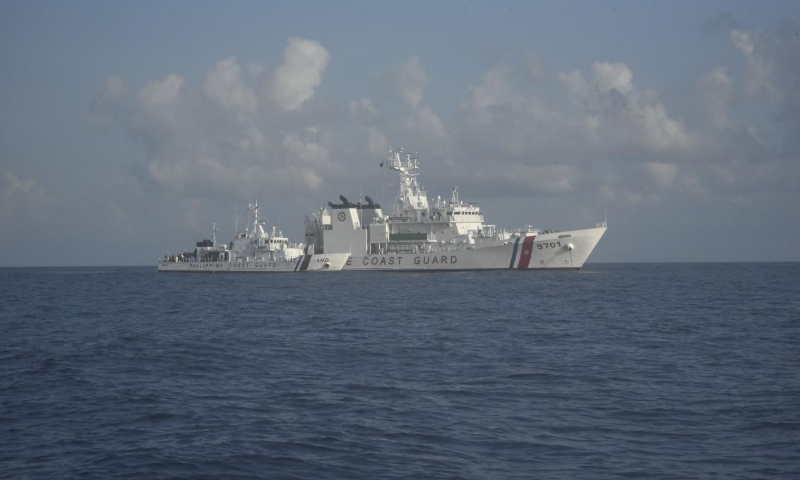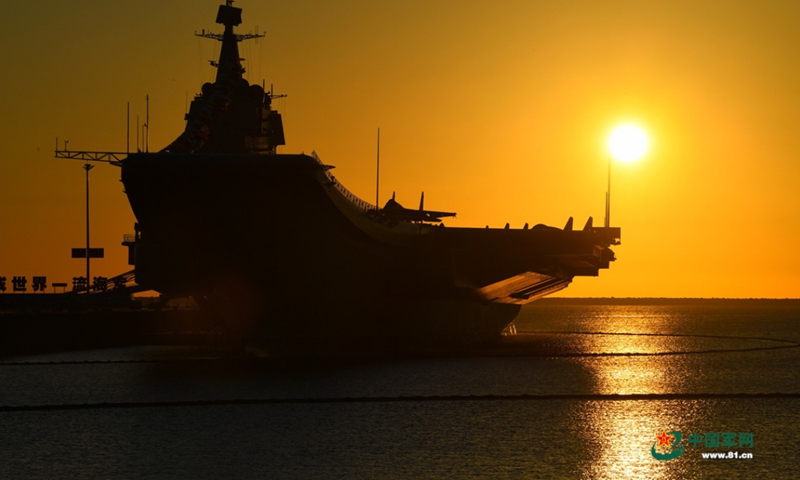Exclusive: Manila to deploy new vessel for 'semi-permanent presence' at China’s Xianbin Jiao, breaking its promise: source

The photo taken on May 3, 2024 shows the Philippine ships 4402 and 9701 are transferring supplies in the waters of China's Xianbin Jiao. Photo: China Coast Guard
The Philippines is planning to send a second coast guard vessel to anchor in the lagoon in China's Xianbin Jiao (also known as Xianbin Reef) in the South China Sea in an attempt to construct a forward deployment base in the form of a semi-permanent floating platform, the Global Times learned from a source familiar with the matter on Wednesday.
Manila is attempting to expand its illegal occupation of China's Xianbin Jiao, a move that seriously violates China's territorial sovereignty, Chinese experts said, noting that China will not let this take place.
Since mid-April, the Philippine Coast Guard's BRP Teresa Magbanua (MRRV-9701) has been illegally and harmfully anchored in the lagoon of the Xianbin Jiao for more than four months.
Now a second ship is scheduled to illegally enter waters adjacent to the Chinese reef and attempt to join the MRRV-9701 in a joint anchoring, according to the source.
The Philippines' intention is very clear: to further expand the established fact of expanding its occupation of the Xianbin Jiao, upgrade the scale of its semi-permanent floating platform, and in effect build a "semi-grounded" forward deployment base, Yang Xiao, deputy director of the Institute of Maritime Strategy Studies under the China Institute of Contemporary International Relations, told the Global Times on Wednesday.
The Nansha Qundao (also known as Nansha Islands), which include the Xianbin Jiao, are China's inherent territories, with China holding undisputed sovereignty over the Nansha Qundao, Yang reiterated.
"China has repeatedly stated that it will not allow the Philippines to wantonly occupy the Xianbin Jiao, so of course China will not allow the Philippines to deploy another large coast guard ship to anchor on the Xianbin Jiao and increase the scale of the floating platform," Yang said.
Manila's vile attempt is a serious violation of the Declaration on the Conduct of Parties in the South China Sea (DOC), which states that the parties undertake to exercise self-restraint in the conduct of activities that would complicate or escalate disputes and affect peace and stability including, among others, refraining from action of inhabiting on the presently uninhabited islands, reefs, shoals, cays, and other features and to handle their differences in a constructive manner.
This latest provocation with malicious intent to disrupt the peaceful situation in the South China Sea seriously undermines international and regional order, and represents a full betrayal on its promise to neighbors and partners, the expert said.
Philippine media have hyped the China Coast Guard's (CCG) presence in the Xianbin Jiao, but it is the Philippines that has sent the MRRV-9701 to the area in the first place. The Philippine ship anchored in the lagoon of the Xianbin Jiao in April, with a CCG ship arriving later in July.
Yang said that the heavy anchor used by the Philippine vessel has damaged underwater coral reefs and ruined habitats of surrounding marine creatures.
Experts called on the international community and neighboring countries to join China in pushing back against the Philippines' illegal provocations in the South China Sea, restore peace in the Xianbin Jiao and prevent damage to fragile and rare marine environments.




